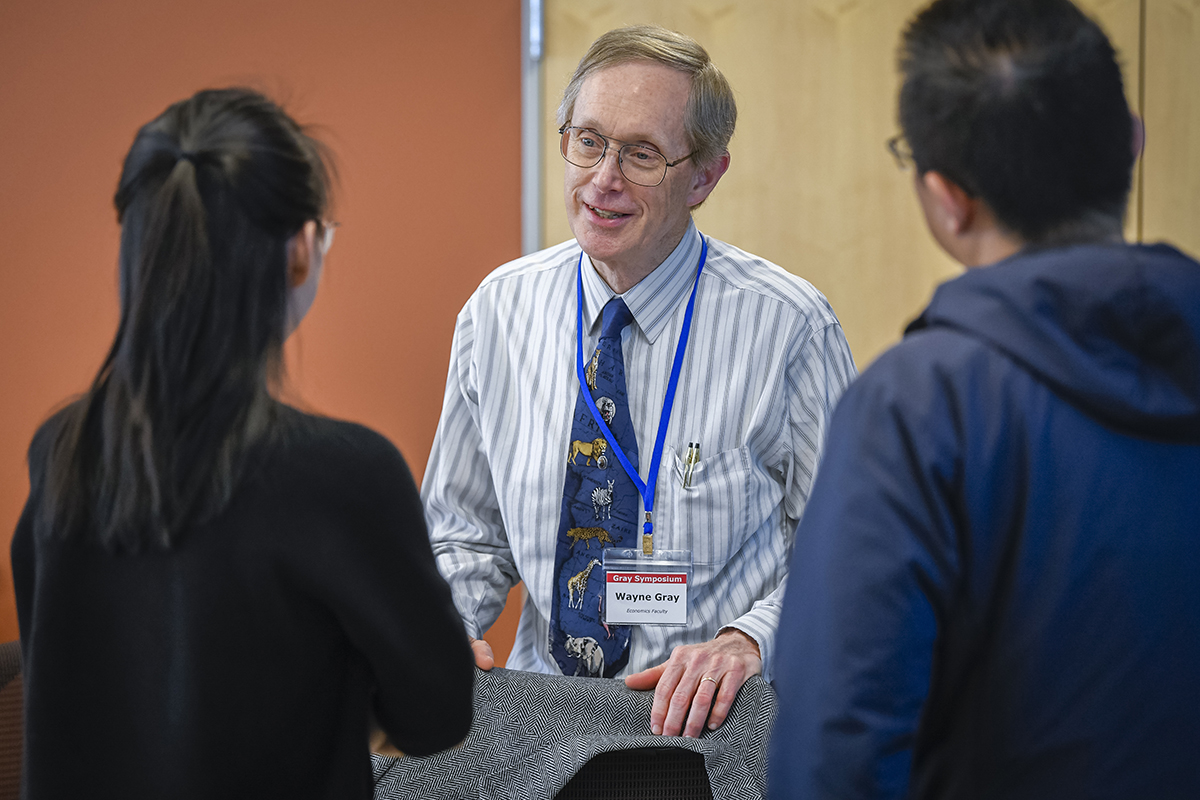Wayne Gray feted by colleagues, former students at day-long symposium
They spoke about displaced workers during the Great Recession, the fraying social safety net, trade linkages, and global value chains.
They examined the financial burden of a cancer diagnosis, the woes of data breaches, and the “geography of innovation” in the United States.
They dove into e-commerce, the economies of cities, and local labor markets.
In fact, the participants who rose to the podium at the Wayne Gray Symposium were fluent in so many subjects that it might surprise an observer to know that they actually shared expertise on a singular topic: Wayne Gray.
The Clark economist, who is retiring from teaching after 41 years in the classroom, was feted by colleagues from across academia during the day-long program held in Room 202 of the Alumni and Student Engagement Center. The presentations were capped by a panel featuring four former students, who recalled the mentorship, collaboration, and friendship of their professor during their Clark days.
Lou Nadeau, Ph.D. ’98, vice president and senior economist at Eastern Research Group, recalled the hard, unglamorous work of compiling data, which taught him the importance of synthesizing information for a general audience. It’s a skill that has served him well in the professional world.
“You always said, ‘You need to explain why [the data] matters to someone who is not an economist,’ ” Nadeau recalled. In dealing with clients, many of them in the federal government, “I’m able to explain what it means and why it matters, and for that, Wayne, I thank you.”
Anna Belova, Ph.D. ’06, director of data science at ICF, a global consulting firm, told Gray that she secured her first job “because of your reputation,” noting that her association with him “got my foot in the door.”
She recalled that Gray not only dealt with facts and figures but also asked his students to consider the ethical ramifications behind policy choices. For example, regarding a particular policy that might affect public health and well-being, he would say, “We could do this. But should we?”
Mollie Murphy ’03, who founded two companies, remembered working as a research assistant for Gray while a Clark undergrad. She marveled at his work ethic, noting that he would grade student papers while running on his treadmill at 5 a.m. “So much of this work is not glamorous, but he showed us that you have to know how to push through to do high-quality work.”
Gray, she said, is “extremely comfortable with who he is and what his values are, while being open to other perspectives.” Murphy said he also displayed total confidence in her abilities. “He kept putting me in situations where I was able to succeed, and convinced me I was smart enough to do the things I wanted to do.”
The session concluded with remarks from Vivek Rao, Ph.D. ’99, P ’27, the principal financial sector specialist at Asian Development Bank, who traveled from his home in the Philippines to pay tribute to his mentor. Gray chaired his doctoral dissertation committee, and advised Rao to pay particular attention to shaping his introduction because it will inform how the rest of his work is received.
Rao said he gleaned valuable insights from his time inside Gray’s classroom, describing his mentor’s teaching style as “an act of optimism” that instilled self-confidence in his students and “prepared us for the road ahead.”





